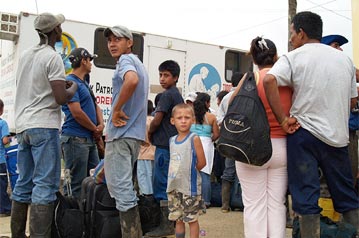Colombian refugees find safety across the border in Ecuador
Colombian refugees find safety across the border in Ecuador

CHICAL, Ecuador, March 5 (UNHCR) - The population of Chical, a remote community in northern Ecuador, has doubled in less than a fortnight after the arrival of some 400 Colombians from across the border. The UN refugee agency is helping to distribute aid to the newcomers.
Men, women and children started crossing the narrow bridge over the San Juan River that separates Chical from Tallambi in Colombia on February 23, the day after members of an irregular armed group killed the local schoolteacher.
Families on both sides of the river know each other well, and people in Chical are used to opening their doors to Colombians fleeing violence. But it is the first time that such a large group has sought shelter with them.
"They are our neighbours and we know what they are going through," Margarita*, an elderly local woman, said. She had welcomed a family of four adults and eight children into her two-roomed wooden house.
One of them, 78-year-old Argeila*, has been a friend of Margarita's for years. She had to be carried across the bridge by her grandchildren, because she can no longer walk. "Now at least she has a mattress to sleep on," Margarita said. "When they got here I had nothing at all to give them."
In the past week, UNHCR has coordinated with the local authorities and partner organisations the distribution of mattresses, food rations and other emergency supplies. The primary school has been turned into a shelter, but most of the new arrivals have found room with local families.
"The local community and the authorities have shown remarkable solidarity with their Colombian neighbours," said Marta Juárez, UNHCR representative in Ecuador, who was in Chical last week.
"Their generosity has provided this group of Colombians with a safe space, not just in terms of physical safety, but also to give them the time to consider their decision to ask for asylum or not."
Doris* has made up her mind; she will not go back to Colombia. Her mother came to Ecuador in 2005 and is now a refugee, but Doris held back in Tallambi, hoping she could make things work for her family. The murder of the teacher destroyed these hopes.
"We can't go on anymore," she said, tears rolling down her cheeks. "Even though it's so hard to leave behind our home and the land that we have worked on all our life, we are not going to go back this time."
Located at the southern tip of Colombia in the volatile Nariño region, Tallambi has been under the control of irregular armed groups for years. Like Doris, a large part of the population belongs to the Awá indigenous group. They have suffered greatly from the armed conflict in this part of the country.
Many of those now in Chical are not sure what to do. They are scared to go back to Colombia, but are distraught at the prospect of abandoning their home. For Angelica*, who has spent 30 years in Tallambi teaching children the Awá language and culture, the decision is an almost impossible one.
"For now, we prefer to wait and see what will happen on the other side," she said, standing under the porch of an improvised community kitchen with her four-year-old granddaughter. "It's difficult to know what is best for the children. It's not safe for them in Colombia, but it is their home."
A UNHCR team will remain in Chical this week to provide the newcomers with the information they need to make an informed decision about whether or not to seek asylum and to organise continuing assistance to the local community.
* Names have been changed for protection reasons
By Marie-Hélène Verney in Chical, Ecuador









